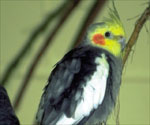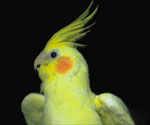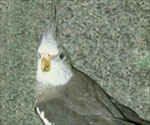
Grey Cockatiel

Lutino Cockatiel

Pearl Cockatiel

White Face Grey Cockatiel

Pied Cockatiel

Grey Cockatiel |

Lutino Cockatiel |

Pearl Cockatiel |

White Face Grey Cockatiel |

Pied Cockatiel |
If properly cared for, a cockatiel can live up to thirty years. This is a smaller member of the parrot family. With its' striking colors and patterns as well as its' ease in taming, the cockatiel makes an excellent pet. They are relatively small in size, averaging about 12 inches in length. Varieties of the domestic cockatiel are: Cinnamon, Lutino, Pearl, Pied, Grey, and White-faced. The most common is the Grey Cockatiel. Cockatiels enjoy being picked up and petted or stroked. They are inquisitive and friendly to both humans and other birds. The cockatiel is a gentle, docile little bird. Males can become adept talkers and whistlers, but are more independent. Some females have been known to talk, but in general are more loving and quiet. Twilight is the best time for voice lessons. Start with two or three words and repeat them over and over. Short words and phrases are easiest to learn. Cockatiels are social birds and prefer to be kept in a colony (family) setting. If breeding is not desired, females can be kept together without difficulty. Cockatiels should eat a staple diet of fresh fortified cockatiel seed or pellet daily. Cockatiels only eat off the top of what is offered, so be sure to check the food daily. Besides a variety of seed mix or pellet, offer chopped dark green and yellow vegetables and a variety of fresh fruits in addition to a protein source like mature legumes, hard cooked chopped egg, and grated cheese. Remove fresh fruits and vegetables within 2 hours of offering to prevent spoilage. If the bird gets too much liquid from the fresh fruits and vegetables, the droppings could become runny. Stop the fresh food for a day to see if this is the reason. Millet Spray also makes an excellent supplement for birds. Birds require fresh water each day. Wash and rinse their water cup out thoroughly prior to adding fresh water to reduce bacteria growth. Powdered vitamins can be lightly sprinkled on the fresh food, but putting it in the water can encourage bacterial growth. When choosing a cage for your cockatiel, remember length is more beneficial to the bird than height. Ideally the cage should measure a minimum of 18" long by 18" high and 22" wide. Perches are an essential part of the cage and should be chosen to suit the feet of the cockatiel. Approximately 3" of perch space per bird is best. A variety of perch sizes, shapes, and diameters will help exercise the bird's feet and toes. Place perches strategically to prevent droppings from contaminating water and food dishes and to prevent the tail from hanging in dishes or on the floor. Toys, such as bells and brass rings, in the cockatiel's cage will keep your bird entertained. Always have a cuttlebone to supply your cockatiel with calcium and prevent beak overgrowth. To aid the bird in keeping itself clean, we recommend placing a suitable size birdbath in the cage on a weekly basis. Place your bird's cage at eye-level in a bright area free from drafts and direct sunlight. |
http://hometown.aol.com/ththing/myhomepage/business.html
http://godfreys-cockatiel-family.za.net/index.php3